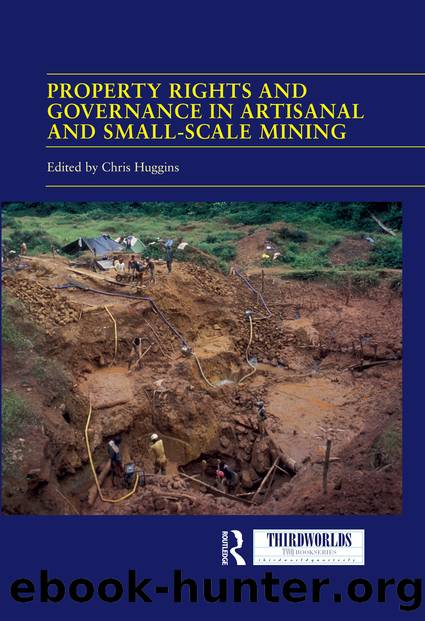Property Rights and Governance in Artisanal and Small-Scale Mining: Critical Approaches by Chris Huggins

Author:Chris Huggins [Huggins, Chris]
Language: eng
Format: epub
ISBN: 9780367236731
Google: N8DawQEACAAJ
Goodreads: 44070840
Publisher: Routledge
Published: 2019-08-19T12:55:22+00:00
Introduction
In this article, I draw on a recent study carried out in the Bakgatla-ba-Kgafela tribal authority area in South Africaâs North West province, to illustrate how the structure of power seems to shape the character of resistance on the platinum-rich communities. This article demonstrates how platinum mining generates intense rural struggles over communal property â land and mining revenues. Some scholars observe that the escalating conflict on the platinum belt epitomises a resurgence of ethnic identities in post-apartheid South Africa.1 However, I argue that competing versions of custom and contrasting group identities that dominate these struggles reveal not just ethnic revitalisation, but serious divisions that challenge the very meaning and existence of âtribal (traditional) communitiesâ. Since rights to communal property are secured through group (âtribalâ) membership and defined through custom, custom itself has become a space for contestation. Therefore, the colonial crystallisation of custom made it difficult to âbendâ when peopleâs social conditions change, but easy to âbreakâ when disputes over property arise. It is this inflexibility in the way the state and the courts conceive custom â as a rigid set of rules â which perpetuates inequality and disputes at village level.
As it surfaces later in the empirical section, this article illustrates this argument through summaries of court disputes over land mining revenues between the Bakgatla chiefs and ordinary villagers. Since the mid-1990s when mining expansion intensified in the Bakgatla area, disputes over the mineral-rich land (farms), mining revenues and political power have also escalated. On several occasions these disputes end up in the courts of law. The courtsâ interpretation of custom in the various judgements significantly favours the chiefsâ powers and control over communal property. I discuss five of these court cases in this contribution. To bring a historical perspective, I discuss the 1956 legal case between Kgosi Tidimane and a village activist, Jacob Pilane who filed a court petition against the chief for his failure to account for the money collected for purchasing certain farms. I then discuss some of the recent court battles between Kgosi Nyalala Pilane and village activists in Lesetlheng, Motlhabe and Sefikile villages in the Bakgatla area. In all these cases the courtsâ interpretation of customary law remains similar, particularly when it comes to the power of chiefs over communal property.
Download
This site does not store any files on its server. We only index and link to content provided by other sites. Please contact the content providers to delete copyright contents if any and email us, we'll remove relevant links or contents immediately.
The Art of Coaching Workbook by Elena Aguilar(51137)
Trainspotting by Irvine Welsh(21608)
The Secret History by Donna Tartt(19002)
Twilight of the Idols With the Antichrist and Ecce Homo by Friedrich Nietzsche(18602)
All the Missing Girls by Megan Miranda(15892)
Cat's cradle by Kurt Vonnegut(15299)
Ready Player One by Cline Ernest(14618)
Talking to Strangers by Malcolm Gladwell(13332)
Fangirl by Rainbow Rowell(9213)
The remains of the day by Kazuo Ishiguro(8949)
The Compound Effect by Darren Hardy(8904)
Thirteen Reasons Why by Jay Asher(8874)
Tools of Titans by Timothy Ferriss(8347)
Periodization Training for Sports by Tudor Bompa(8237)
Wonder by R. J. Palacio(8085)
The Lover by Duras Marguerite(7876)
A Court of Wings and Ruin by Sarah J. Maas(7789)
Change Your Questions, Change Your Life by Marilee Adams(7718)
The Complete Stick Figure Physics Tutorials by Allen Sarah(7352)
